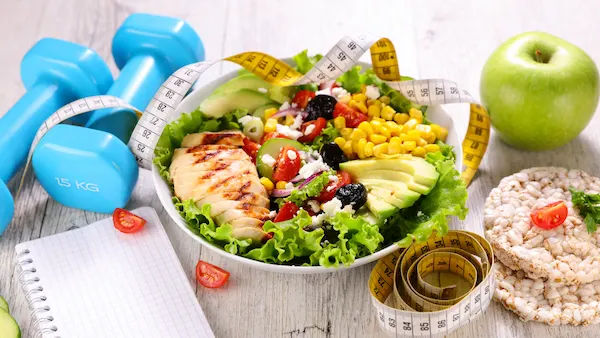Diet Guide for the Modern Working Woman
Discover practical dietary tips for the modern working woman to stay healthy, energised, and balanced throughout the day.

Written by Dr. M L Ezhilarasan
Reviewed by Dr. Dhankecha Mayank Dineshbhai MBBS
Last updated on 13th Jan, 2026

Introduction
Juggling deadlines, meetings, and personal commitments, the modern working woman often places her own well-being on the back burner. In this high-pressure environment, maintaining a healthy dietary routine can feel like an impossible task. The lure of quick, processed snacks and sugary drinks is strong, but the cost to your energy, focus, and long-term health is even stronger. This comprehensive guide is designed specifically for you. We’ll move beyond generic advice to provide practical, actionable dietary strategies that fit seamlessly into a demanding schedule. From understanding the essential nutrients your body craves to mastering meal prep and conquering workplace temptations, this article will empower you to take control of your nutrition. You’ll discover how the right food choices can be your greatest ally in achieving peak productivity, managing stress, and fostering lasting vitality. Let’s transform the way you eat at work, one smart choice at a time.
Why a Working Woman’s Diet Needs Special Attention
The lifestyle of a working woman presents unique challenges that can easily derail the best dietary intentions. Understanding these challenges is the first step toward overcoming them.
The Impact of a Hectic Schedule on Eating Habits
A packed calendar often leads to skipped meals, most commonly breakfast. This sets off a chain reaction: by mid-morning, you’re ravenous, leading to poor snack choices or overeating at lunch. The "time crunch" also makes ultra-processed, convenient foods highly appealing, even though they are typically low in nutrients and high in empty calories. This pattern can disrupt metabolism, cause energy crashes, and contribute to weight gain over time.
Common Nutritional Deficiencies in Working Women
Due to physiological factors like menstruation and often prioritising family meals over their own needs, working women are particularly susceptible to specific nutritional deficiencies. Iron deficiency is common, leading to fatigue and reduced immunity. Inadequate intake of Calcium and Vitamin D, especially for those in office settings with limited sun exposure, can impact long-term bone health. Furthermore, chronic stress can deplete B vitamins, which are crucial for energy production and nervous system function. If you experience persistent fatigue, it might be wise to consult a doctor online with Apollo24|7 to check if a deficiency is the cause. Apollo24|7 offers a convenient home collection for tests like vitamin D, making it easier to get insights into your health.
Get Your Health Assessed
Foundational Nutrients for Sustained Energy and Health
Fueling your body correctly isn't about deprivation; it's about ensuring you get the right building blocks. Focusing on these key nutrients will provide a solid foundation for your dietary plan.
Iron: Combating Fatigue and Brain Fog
Iron is essential for producing haemoglobin, which carries oxygen in your blood. Low iron levels can directly cause tiredness, shortness of breath, and difficulty concentrating, symptoms that severely impact work performance. For women, the need is higher. Include haem iron (better absorbed) from sources like lean red meat and poultry, and non-haem iron from lentils, spinach, and fortified cereals. Pairing non-haem iron with Vitamin C (e.g., a squeeze of lemon on spinach) enhances absorption.
Calcium and Vitamin D: Building Long-Term Bone Health
Osteoporosis is a significant concern for women later in life, but bone health is built in your youth and maintained through adulthood. Calcium strengthens bones, while Vitamin D is necessary for your body to absorb it. Many working women spend little time outdoors, leading to Vitamin D deficiency. Include dairy products, leafy greens, and fortified plant-based milk for calcium. For Vitamin D, seek safe sun exposure and consider fatty fish and eggs. A simple blood test can determine your levels.
B Vitamins: Your Secret Weapon for Stress Management
The family of B vitamins (especially B6, B12, and Folate) plays a vital role in converting food into energy and regulating the nervous system. They are crucial for the production of neurotransmitters like serotonin, which influences mood. Under constant stress, your body uses up these vitamins more quickly. Incorporate whole grains, eggs, legumes, and dark leafy greens into your dietary habits to ensure you have the resources to manage stress effectively.
Consult a Dietitian for the best advice
Mastering the Art of Strategic Meal Planning
The single most effective strategy for healthy eating as a busy professional is planning. A little effort on the weekend can save you from daily dilemmas and poor choices.
The Power of a Protein-Packed Breakfast
Skipping breakfast is a recipe for a mid-morning crash. Instead of a carbohydrate-heavy meal like toast or a pastry, opt for one rich in protein and healthy fats. This provides sustained energy and keeps you full for longer. Think Greek yoghurt with berries and nuts, a vegetable omelet, or a smoothie with protein powder, spinach, and avocado. These quick breakfast for working women options take minutes to prepare but set a positive tone for the entire day.
Building a Balanced and Satisfying Lunch
Relying on cafeteria food or takeout often means meals high in sodium, unhealthy fats, and calories. The best solution is packing your lunch. A simple formula is: Lean Protein + Complex Carb + Healthy Fat + Vegetables. For example, grilled chicken quinoa bowl with roasted veggies and a tahini dressing, or a chickpea and avocado whole-wheat wrap with a side salad. Preparing components in bulk during meal prepping makes assembly effortless each morning.
Smart Strategies for Healthy Office Snacking
The afternoon slump is real, and reaching for a cookie or chips is a common response. Outsmart cravings by having healthy alternatives readily available. Keep a stash of the best snacks for energy at the office in your desk drawer: almonds, walnuts, pumpkin seeds, whole fruit, protein bars with minimal sugar, or single-serving Greek yoghurts. These options provide a mix of protein, fibre, and good fats to stabilise blood sugar and power you through the rest of your workday.
Conquering Common Workplace Dietary Pitfalls
Even with the best plans, office culture can present obstacles. Being prepared with strategies is key.
Navigating Office Treats and Peer Pressure
Birthday cakes, team lunches, and colleagues bringing in treats are a part of office life. Completely abstaining can feel antisocial, but indulging daily is unsustainable. The key is mindful moderation. You don't have to say no every time. Have a small portion, savour it, and then get back on track with your next meal. Politely declining by saying, "That looks amazing, but I'm full from lunch," is always a valid option.
Beating the 3 PM Energy Slump Without Sugar
When fatigue hits, the instinct is to grab a coffee and a sugary snack. This gives a quick spike followed by a crash. Instead, try these tactics: First, drink a large glass of water; dehydration is a common cause of fatigue. Second, take a five-minute walk, even if it's just around the office. Third, if you need a snack, choose one from your healthy stash. This combination addresses the root causes rather than just the symptom.
Healthy Alternatives for Stress-Eating
When a project gets overwhelming, it's easy to turn to food for comfort. The first step is awareness. Recognise when you’re eating out of stress versus hunger. If you feel the urge, try a non-food coping mechanism first: take three deep breaths, step away from your desk for two minutes, or listen to a favorite song. If you still want to eat, choose a crunchy, healthy option like carrot sticks or apple slices, which can be satisfying and help manage stress eating at work.
Hydration: The Overlooked Key to Productivity
Water is involved in every cellular process in your body, including energy production and brain function. Even mild dehydration can cause headaches, poor concentration, and fatigue, often mistaken for hunger. Keep a large water bottle on your desk as a constant visual reminder. Aim to finish it by lunch and refill it for the afternoon. Infuse water with lemon, cucumber, or mint if you find plain water boring. Herbal teas are another excellent way to stay hydrated.
Conclusion
Navigating a successful career while maintaining your health is not about perfection; it’s about making consistent, smart choices. Your dietary habits are a powerful tool that you can harness to enhance your energy, sharpen your focus, and build resilience against stress. By understanding your unique nutritional needs, embracing the practicality of meal planning, and developing strategies to handle workplace challenges, you can transform your relationship with food. Remember, this is a journey of self-care, not a rigid set of rules. Start by implementing one or two tips from this guide, and gradually build from there. Your body and your career will thank you for the investment. Take the first step today towards a healthier, more vibrant you.
Consult a Dietitian for the best advice
Consult a Dietitian for the best advice

Ms. Sreeparna Dey Dhara Deb
Dietician
10 Years • DNHE
Bansdroni
Siddhita Healthcare., Bansdroni

Ms. Samapti Maity
Dietician
16 Years • MSc. (Clinical Nutrition & Dietitics), NDEP, Course in Maternal Infant Young Child Nutrition.Diploma in Sports Nutrition, Diploma in Diabetic educator, FODMAP Specialist
Kolkata
BIENETRE CLINIC, Kolkata

Ms Suvashree Bhattacharya
Dietician
7 Years • Allied Healthcare professional
Dumdum
Sigma Health Care, Dumdum

Ms. Soma Saha
clinical nutrition
17 Years • B.Sc. - Home Science (Food & Nutrition), M.Sc. - Home Science (Food & Nutrition)
Kolkata
Dr Utsa Basu Clinic, Kolkata
(50+ Patients)

Ms Suchanda Guha
Dietician
10 Years • M.Sc (Applied Nutrition), B.Sc (Food & Nutrition), Diploma (Yogic Nutrition)
Kolkata
NutriKutir, Kolkata
Consult a Dietitian for the best advice

Ms. Sreeparna Dey Dhara Deb
Dietician
10 Years • DNHE
Bansdroni
Siddhita Healthcare., Bansdroni

Ms. Samapti Maity
Dietician
16 Years • MSc. (Clinical Nutrition & Dietitics), NDEP, Course in Maternal Infant Young Child Nutrition.Diploma in Sports Nutrition, Diploma in Diabetic educator, FODMAP Specialist
Kolkata
BIENETRE CLINIC, Kolkata

Ms Suvashree Bhattacharya
Dietician
7 Years • Allied Healthcare professional
Dumdum
Sigma Health Care, Dumdum

Ms. Soma Saha
clinical nutrition
17 Years • B.Sc. - Home Science (Food & Nutrition), M.Sc. - Home Science (Food & Nutrition)
Kolkata
Dr Utsa Basu Clinic, Kolkata
(50+ Patients)

Ms Suchanda Guha
Dietician
10 Years • M.Sc (Applied Nutrition), B.Sc (Food & Nutrition), Diploma (Yogic Nutrition)
Kolkata
NutriKutir, Kolkata
More articles from Diet for Weight Loss
Frequently Asked Questions
hat is a good quick breakfast for a working woman with no time?
A smoothie is your best friend! Blend spinach, a frozen banana, a scoop of protein powder, and almond milk. You can drink it on your commute. Alternatively, overnight oats prepared the night before are a ready-to-eat option full of fibre and energy.
How can I manage healthy eating with PCOS and a busy work schedule?
Focus on a low-glycemic index diet to manage insulin resistance, a key factor in PCOS. This means prioritising complex carbs (like whole grains and legumes), lean protein, and healthy fats. Meal prepping is especially crucial here to avoid sugary, processed foods during a busy day. If you need a personalised plan, consulting a doctor online with Apollo24|7 can provide guidance tailored to your specific needs.
I get bad cravings for sweets after lunch. How can I stop this?
This often signals a lunch that was too high in refined carbohydrates. Ensure your lunch includes a good source of protein (chicken, fish, tofu, lentils) and fibre (vegetables, quinoa). This combination helps stabilise blood sugar, preventing the sharp spikes and drops that trigger cravings.
Are there any healthy ready-to-eat snacks I can buy?
Yes! Look for single-serving packs of unsalted nuts, seeds, or roasted chickpeas. Plain Greek yogurt, cottage cheese cups, and whole fruit like apples or bananas are also excellent, convenient choices. Always check labels for added sugars.
How much water should I really be drinking at work?
A general guideline is 8-10 glasses (about 2 litres) per day. A more personalised approach is to drink enough so that your urine is light yellow or clear. Keeping a 1-litre bottle on your desk and aiming to finish it by midday is a great practical goal.





